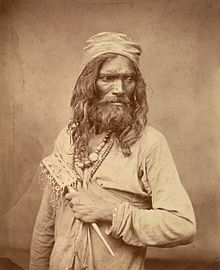This article has multiple issues. Please help improve it or discuss these issues on the talk page. (Learn how and when to remove these messages)
|

| Part of a series on Islam Sufism |
|---|
 |
|
|
Fakir, faqeer, or faqīr (/fəˈkɪər/; Arabic: فقیر (noun of faqr)), derived from faqr (Arabic: فقر, 'poverty'),[1] is an Islamic term traditionally used for Sufi Muslim ascetics who renounce their worldly possessions and dedicate their lives to the worship of God. They do not necessarily renounce all relationships, or take vows of poverty, but the adornments of the temporal worldly life are kept in perspective. The connotations of poverty associated with the term relate to their spiritual neediness, not necessarily their physical neediness.[2][3]
They are characterized by their reverence for dhikr (a devotional practice which consists of repeating the names of God with various formulas, often performed after the daily prayers).[4] Sufism in the Muslim world emerged during the early Umayyad Caliphate (661–750 CE)[5] and grew as a mystic[6] tradition in the mainstream Sunni and Shia denominations of Islam,[6] which according to Eric Hanson and Karen Armstrong was likely in reaction to "the growing worldliness of Umayyad and Abassid societies".[7] Sufi Muslim ascetics (fakirs and dervishes) were highly influential and greatly successful in spreading Islam between the 10th and 19th centuries,[6] particularly to the furthest outposts of the Muslim world in the Middle East and North Africa, the Balkans and Caucasus, the Indian subcontinent, and finally Central, Eastern, and Southeast Asia.[6] Sufi Muslims have spread throughout several continents and cultures over a millennium, originally expressing their beliefs in Arabic, before spreading into Persian, Turkish, Indian languages, and a dozen other languages.[8]
The term fakir has taken on a more recent and colloquial usage for an ascetic who renounces worldly possessions, and has even been applied to non-Muslims.[9][10] Fakirs are prevalent in the Middle East and South Asia; they are thought to be self-sufficient and possess only the spiritual need for God.[11] The term is also frequently applied to Hindu ascetics (e.g., sadhus, gurus, swamis, and yogis).[12] These usages developed primarily in the Mughal era in the Indian subcontinent. There is also a distinct clan of faqeers found in North India, descended from communities of fakirs who took up residence at Sufi shrines.
- ^ Ebrahim, Alireza (2018). "Faqr". In Madelung, Wilferd; Daftary, Farhad (eds.). Encyclopaedia Islamica. Translated by Gholami, Rahim. Leiden and Boston: Brill Publishers. doi:10.1163/1875-9831_isla_COM_036099. ISSN 1875-9823.
Faqr (literally, 'poverty') is a term denoting different modalities and stages of material, psychological and spiritual want and neediness which a wayfarer on the Sufi path may adopt as a means to progress in earning God's love and compassion and of acquiring purity and mystical knowledge. The term faqr is derived from the Arabic root f-q-r, literally meaning 'to hollow out', 'to perforate', 'to make/become poor', 'to be in need' or 'to be/become needy'. Hence faqr carries a general sense of being in a state of penury or destitution.
- ^ "Faqīr". Oxford Reference. Retrieved 23 May 2020.
- ^ "Faqir - Oxford Islamic Studies Online". www.oxfordislamicstudies.com. Archived from the original on August 17, 2021. Retrieved 23 May 2020.
- ^ A Prayer for Spiritual Elevation and Protection (2007) by Muhyiddin Ibn 'Arabi, Suha Taji-Farouki
- ^ Hawting, Gerald R. (2000). The first dynasty of Islam: The Umayyad Caliphate AD 661-750. Routledge. ISBN 978-0-415-24073-4. See Google book search.
- ^ a b c d Cook, David (May 2015). "Mysticism in Sufi Islam". Oxford Research Encyclopedia of Religion. Oxford: Oxford University Press. doi:10.1093/acrefore/9780199340378.013.51. ISBN 9780199340378. Archived from the original on 28 November 2018. Retrieved 4 January 2022.
- ^ Hanson, Eric O. (2006). Religion and Politics in the International System Today. New York: Cambridge University Press. pp. 102–104. doi:10.1017/CBO9780511616457. ISBN 978-0-521-85245-6.
- ^ Michael Sells, Early Islamic Mysticism, p. 1
- ^ Dobe, Timothy S. (2015). Hindu Christian Faqir: Modern Monks, Global Christianity, and Indian Sainthood. Oxford University Press. doi:10.1093/acprof:oso/9780199987696.001.0001. ISBN 978-0-19-934627-1.
- ^ Nanda, B. R. (2004). Churchill's 'Half-naked Faqir'. Oxford University Press. ISBN 978-0-19-908141-7.
- ^ "Encyclopædia Britannica". britannica.com. Retrieved 2015-07-10.
- ^ Colby, Frank Moore; Williams, Talcott (1918). The New International Encyclopaedia. Dodd, Mead. p. 343. Retrieved 9 December 2016.
Fakir: In general a religious mendicant; more specifically a Hindu marvel worker or priestly juggler, usually peripatetic and indigent.